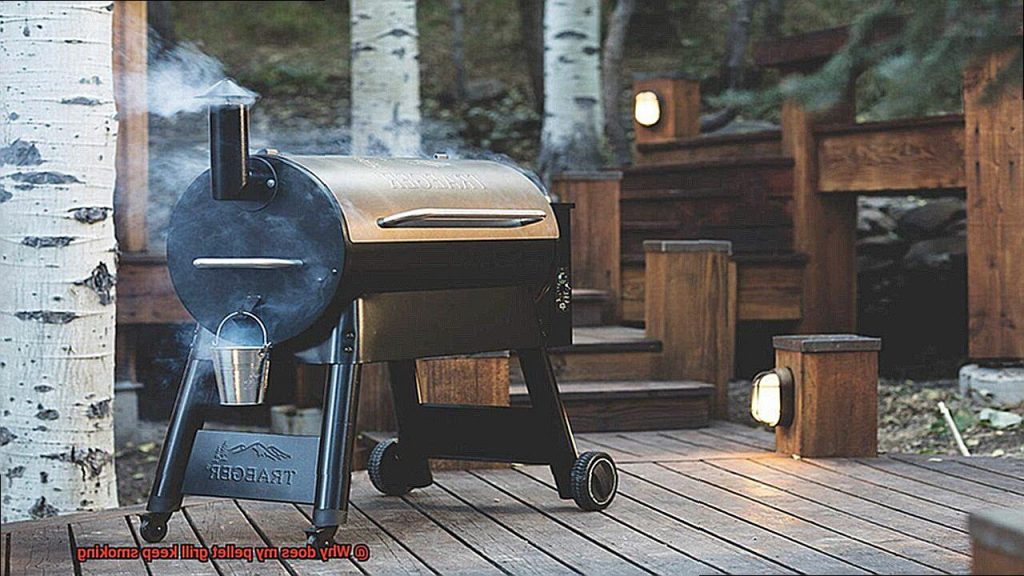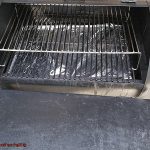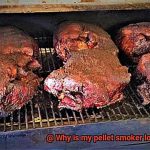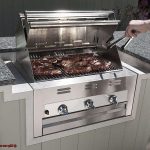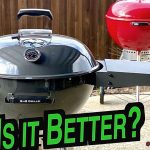Do you love the taste of perfectly smoked meat but find that your pellet grill is producing too much smoke, even when you’re not trying to add more flavor? Don’t worry, you’re not alone. Many grill enthusiasts face this problem and wonder why their pellet grills keep smoking, especially when they’ve set the temperature to a low setting.
It seems like BBQ should be simple – just add pellets to the hopper, set your desired cooking temperature, and let the grill do its thing. But when there’s too much smoke, it can ruin your meal and leave a bad taste in your mouth. So what’s causing this issue?
The main source of smoke in pellet grills is the combustion process that generates heat. However, if you’re experiencing over-smoking, there could be other factors at play such as poor-quality pellets, airflow restrictions, damaged components or excessive grease buildup.
But fear not. In this post, we’ll explore the reasons behind over-smoking on a pellet grill and provide practical tips to help you prevent it from happening again. Whether you’re a seasoned pitmaster or a newbie enthusiast, this guide will help you unlock the full potential of your pellet smoker. So grab your apron and let’s get started.
Contents
Poor Quality Pellets
However, this experience can quickly turn sour if the quality of the pellets used is poor. The resulting excess smoke can ruin the taste of your food and make cooking a frustrating experience.
So, what causes poor quality pellets? Often, it’s due to an excessive percentage of bark and impurities or moisture content that’s too high. This issue can be avoided by purchasing pellets from a reputable supplier that offers 100% hardwood pellets with no fillers or additives. Pellets with the right moisture content, approximately 6-8%, are also essential for an efficient cooking experience.
Storing pellets properly is equally crucial to prevent moisture buildup. A dry, cool place away from direct sunlight or humid environments is ideal.
Aside from using high-quality pellets, keeping your grill clean is paramount to reducing excessive smoke production. Regular cleaning of the grill’s burn pot, checking for obstructions in airflow, and avoiding cooking at too high temperatures can further help reduce smoke production.
High Temperature
Well, high temperature could be the culprit behind this problem. When the temperature of your pellet grill is too high, it can cause the pellets to burn too quickly, resulting in excess smoke. This can occur if the grill is set at a temperature higher than recommended for the type of pellets being used.
To prevent excessive smoke, it’s vital to use the right type of pellets and follow the manufacturer’s instructions for setting the temperature. Different pellets have different burning temperatures, and using the wrong ones can damage your grill and ruin your food. It’s essential to keep an eye on your temperature gauge and adjust the settings accordingly to avoid too much smoke and ensure your food is cooked correctly.
Another reason why high temperature can cause excess smoke is a lack of proper airflow. When the grill is too hot, stagnant air builds up inside, leading to an accumulation of smoke. You can avoid this issue by ensuring enough space between the pellets and checking that your air intake and exhaust vents are clear and functioning correctly.
In summary, maintaining proper temperature control and airflow is crucial for preventing excessive smoke on your pellet grill. Here are some tips to help you achieve this:
- Use the right type of pellets and follow the manufacturer’s instructions for setting the temperature.
- Keep an eye on your temperature gauge and adjust the settings as needed.
- Ensure there is enough space between the pellets and that your air intake and exhaust vents are clear and functioning properly.
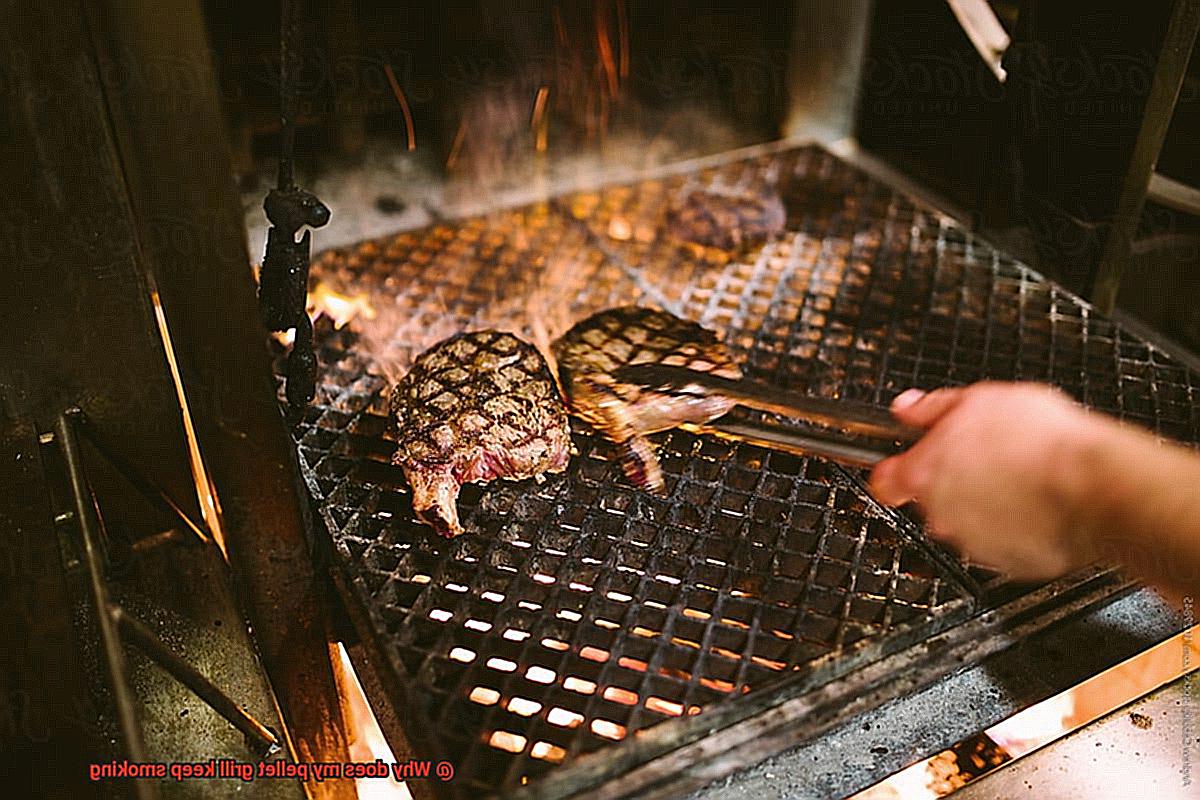
Dirty Grill
The culprit behind this pesky problem is often a dirty grill. Over time, grease and food particles accumulate on the grill grates, heat diffuser, and inside the firepot, causing the pellets to smolder instead of burning cleanly.
Fear not, my friends. With some expert advice, you can keep your pellet grill clean and prevent excessive smoke. Regular cleaning is key to avoiding buildup. Start by preheating your grill to 350 degrees Fahrenheit for 10-15 minutes to loosen any debris. Then, use a grill brush or scraper to remove excess grease or food particles from the grates and heat diffuser.
Don’t forget to remove the drip tray and clean it thoroughly with warm soapy water. If stubborn buildup persists, consider using a degreaser. Rinse everything well and allow it to dry completely before using your grill again.
If your pellet grill continues to produce excessive smoke after cleaning, it’s time to check the firepot. A clogged firepot can cause pellets to back up and create more smoke than necessary. To clean the firepot, remove the grate covering it and use a vacuum or brush to remove any ash or debris.
In summary, keeping your pellet grill clean and well-maintained is essential for preventing excessive smoke. Here are some key tips:
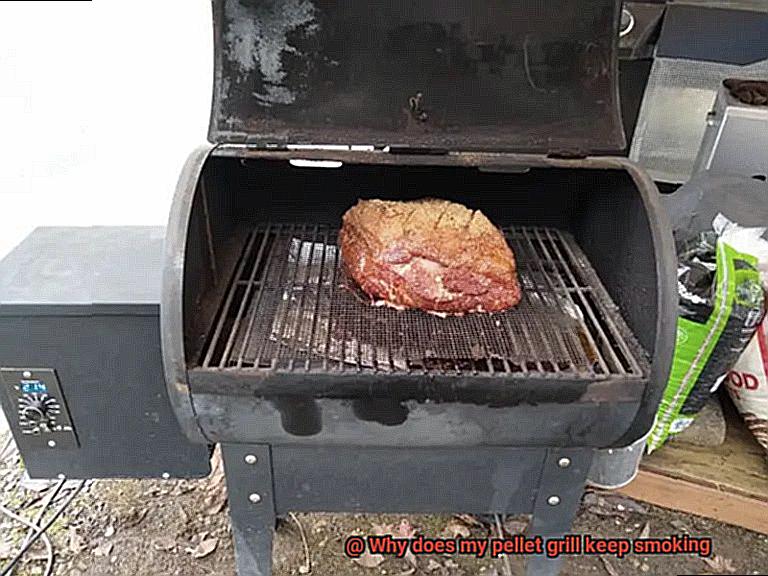
- Clean your grill regularly
- Preheat your grill to loosen debris
- Use a grill brush or scraper to remove excess grease or food particles
- Remove and clean the drip tray with warm soapy water
- Consider using a degreaser for stubborn buildup
- Check the firepot for clogs and clean if necessary
Wind Conditions
Wind can disrupt the airflow and cause uneven burning of pellets, leading to excess smoke production. But don’t fret. We’ve got you covered with expert tips on how to deal with this issue.
The first thing to understand is that pellet grills require a consistent flow of air to maintain the ideal temperature and airflow. If there’s too much wind, it can disrupt this balance and lead to uneven burning. So, what can you do?
One effective solution is to use a windbreak around your grill. This could be as simple as placing the grill in a sheltered location near a wall or under an overhang. Alternatively, you could construct a more permanent windbreak using materials like wood, metal, or plexiglass. A proper windbreak not only reduces excess smoke but also makes grilling more comfortable.
Another option is to adjust the temperature settings on your pellet grill. If the grill is set at a high temperature on a windy day, it may produce excess smoke. Lowering the temperature will help reduce smoke production.
But wait, there’s more. Wind conditions can also affect the cooking time of your food. Strong gusts of wind blowing directly onto your grill can cause the food to cook faster than expected. To avoid overcooking your food, consider lowering the temperature or adjusting your cooking time accordingly.
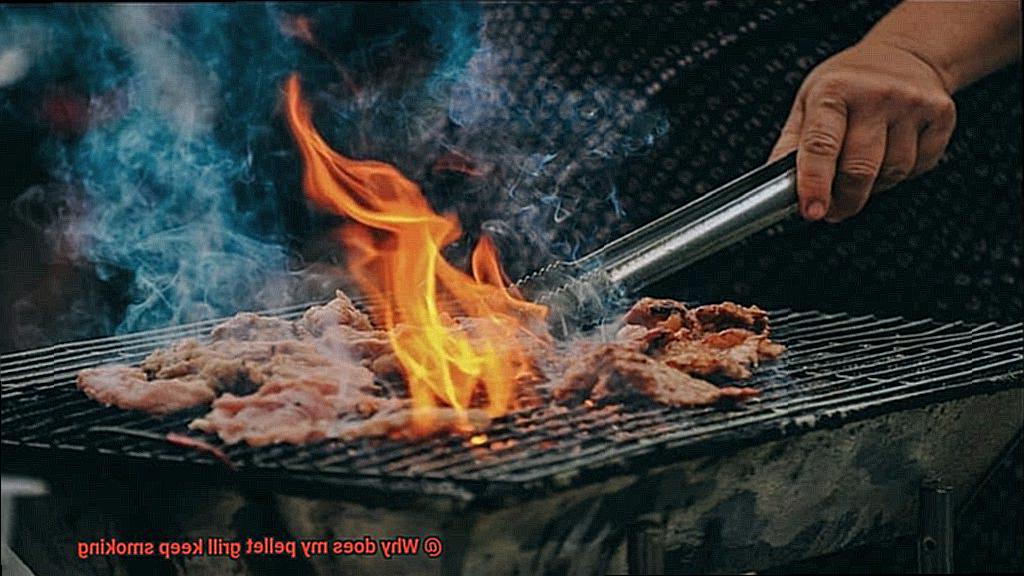
Moisture Content
Then, understanding the impact of moisture content on your grill is a must. As a grilling expert, I’m excited to share some valuable insights on this topic that will help you achieve exceptional results.
Firstly, let’s discuss how moisture content affects your pellet grill’s performance. High moisture content in pellets can cause excessive smoke production and uneven burning. This issue can be easily resolved by using pellets with low moisture content.
Now, let’s delve into some of the sub-topics that you need to know about:
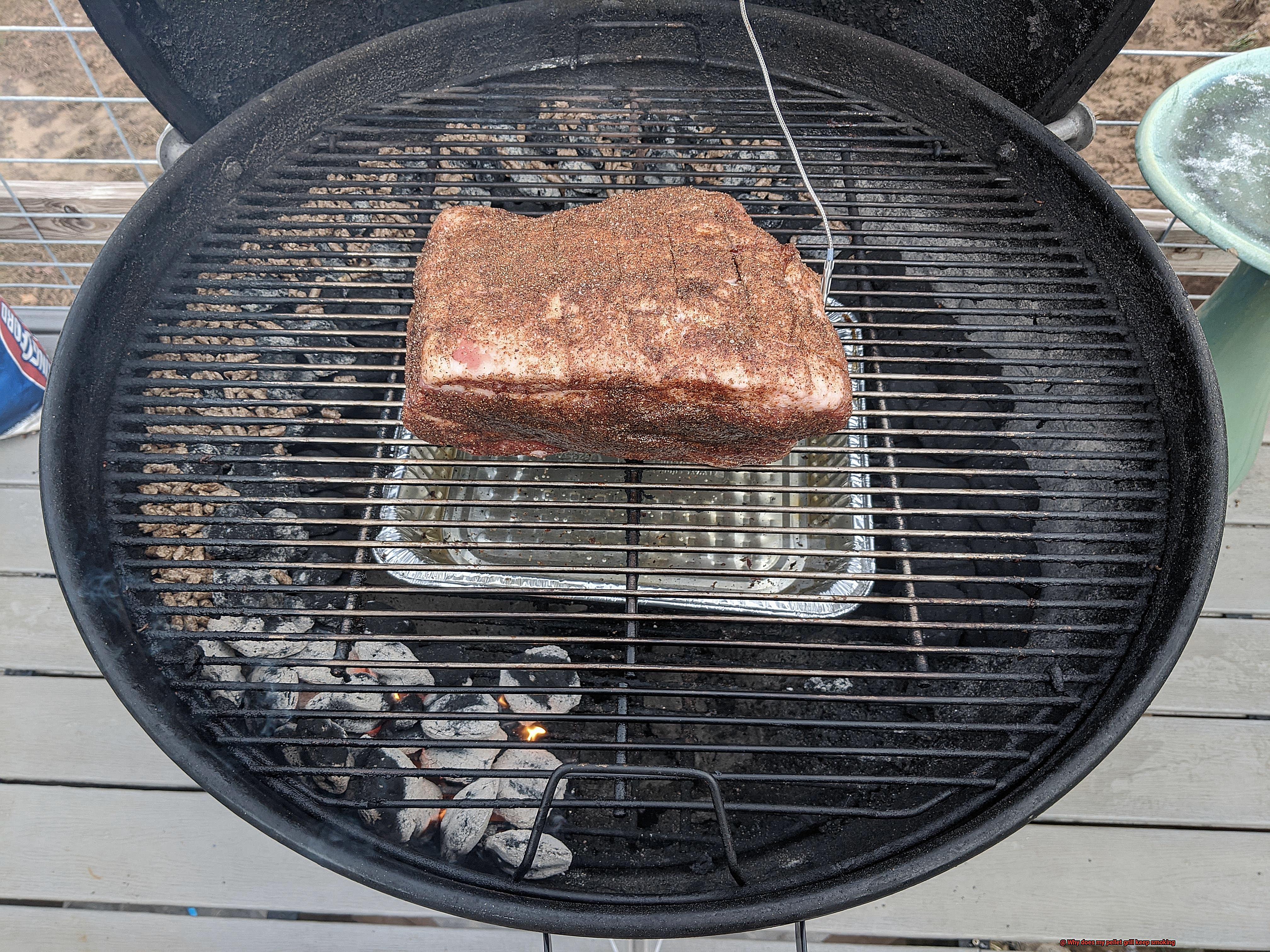
Excessive Smoke Production
If you’re experiencing too much smoke production from your pellet grill, high moisture content might be the culprit. This can also lead to uneven burning, affecting the overall quality of your food.
Proper Storage
To prevent pellets from absorbing moisture, proper storage is essential. If you live in a humid area, consider using a dehumidifier or storing your pellets in an airtight container with a desiccant to maintain their dryness.
Preheating Your Pellets
Preheating your pellets before grilling is another effective way to reduce moisture content. This process helps dry out any excess moisture, ensuring that your pellets burn evenly and produce consistent results.
Clumping and Jamming in the Hopper
High moisture content can also cause clumping and jamming in the hopper, leading to issues with your grill’s performance. To avoid this problem, use only high-quality pellets with low moisture content and store them properly.
Solutions to Reduce Smoke from Pellet Grills
Not to worry, there are several solutions to reduce smoke from pellet grills without compromising on flavor.
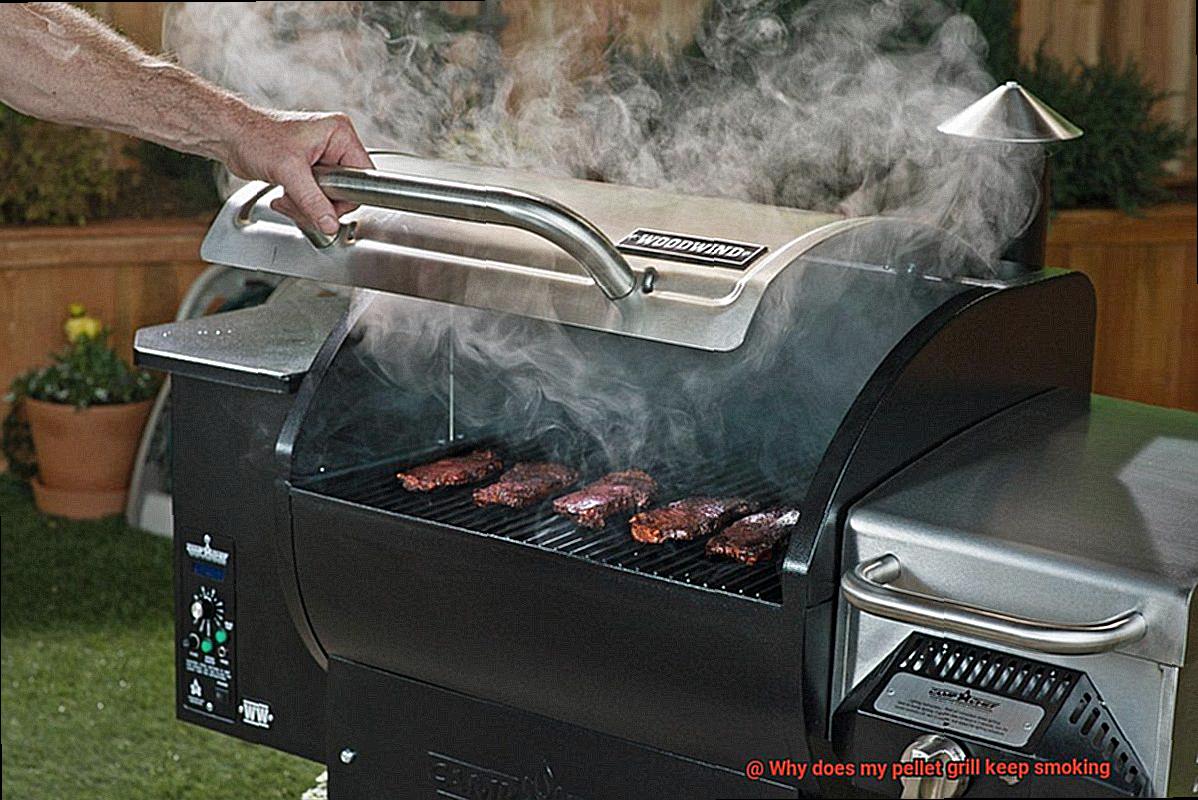
First things first, keep your pellet grill clean. Grease buildup can cause flare-ups and excessive smoke, so be sure to scrape off any excess grease with a scraper tool and wipe the grates clean with a damp cloth. This simple step can significantly reduce smoke production.
Using high-quality pellets specifically designed for low-smoke cooking is another effective solution. Hardwoods like hickory or oak produce less smoke compared to softer woods like pine or spruce. Avoid pellets that contain fillers or binders, as these can also contribute to excessive smoke.
Temperature control is crucial when it comes to reducing smoke production. Monitor the temperature of the grill and adjust it accordingly to avoid burning the pellets too quickly and producing more smoke. The key is to maintain a consistent temperature without going too high.
Adding a heat diffuser or drip pan to your pellet grill can also help reduce smoke. A heat diffuser helps distribute heat evenly throughout the grill and prevents hot spots, which can cause flare-ups and excessive smoke. A drip pan catches any excess grease or liquid that drips from the food, preventing it from falling onto the hot coals and causing flare-ups.
Cleaning Your Grill Regularly
There’s nothing quite like the mouth-watering aroma of meat cooking on a pellet grill. However, if you’re noticing thick, noxious smoke emanating from your grill, it may be time to give it a good cleaning. Regular cleaning is a crucial aspect of maintaining your pellet grill, and it’s one of the most common reasons why grills start smoking excessively.
Why is it so important to clean your pellet grill? Well, let’s explore some reasons:
- Excessive Smoke Production: Grease and food particles accumulate on the grates and drip tray during the grilling process, leading to thick, unpleasant smoke.
- Fire Hazard: A dirty grill increases the risk of fire due to grease buildup on the grates and drip tray.
- Lifespan of Your Grill: A clean grill lasts longer than an unclean one. Regular cleaning not only reduces smoke production but also prolongs your grill’s lifespan.
Now that we understand the importance of regular cleaning let’s dive into how to clean your pellet grill effectively:
- Remove Detachable Parts: Start by removing the grates and any other detachable parts. Use a grill brush to scrub the grates thoroughly, removing any food particles or debris.
- Clean the Drip Tray: Remove the drip tray and scrape off any excess grease or debris. You can wash it with hot soapy water and dry it before putting it back in the grill.
- Check the Fire Pot: Ash buildup in the fire pot can cause airflow problems leading to excessive smoke production. Remove any ash from the firepot and surrounding area with a shop vac or brush.
- Wipe Down the Exterior: Lastly, wipe down the exterior of your pellet grill with a damp cloth. You can use mild soapy water to clean stubborn stains or grease marks. Ensure that you dry off the exterior of the grill thoroughly before using it again.
Using High-Quality Pellets
The solution is simple: use high-quality pellets. As an expert in all things pellet grilling, I can attest to the fact that the type and quality of pellets used can make or break your meal.
Low-quality pellets that contain fillers or binders can result in excess smoke and subpar flavor. Who wants that? You deserve better, and that’s where high-quality pellets come in. Made from 100% natural wood with no additives, these pellets burn cleaner and produce less ash, resulting in less smoke and better flavor. Plus, they come in a variety of delicious flavors, giving you endless options for flavoring your food.
But how do you know if you’re using high-quality pellets? Look for certifications, such as the Pellet Fuels Institute (PFI) or Forest Stewardship Council (FSC) certification. These certifications guarantee that the pellets are made from sustainable sources and meet certain quality standards, so you can trust that you’re getting the best product possible.
In addition to quality, size and shape are also crucial factors to consider when selecting pellets. Choosing pellets that are too large or too small may lead to inconsistent heat and smoke production, resulting in uneven cooking and a less-than-perfect meal. Make sure to select pellets specifically designed for your pellet grill and follow the manufacturer’s recommendations for optimal results.
aZubxj_1F7E” >
Conclusion
In conclusion, dealing with excessive smoke on your pellet grill can be a real pain in the neck and can ruin the flavor of your food. But don’t worry, there are several reasons why this could be happening, including poor quality pellets, high temperatures, dirty grills, wind conditions, and moisture content. To avoid over-smoking on your pellet grill, it’s crucial to use high-quality pellets that have low moisture content and follow the manufacturer’s instructions for setting the temperature.
Keeping your grill clean is also essential for reducing excessive smoke production. You can keep it clean by regularly cleaning the grill’s burn pot, checking for obstructions in airflow, and avoiding cooking at too high temperatures. Additionally, adding a heat diffuser or drip pan to your pellet grill can help reduce smoke production.
Finally, using high-quality pellets that are specifically designed for low-smoke cooking is an effective solution. By following these tips and tricks, you can unlock the full potential of your pellet smoker and enjoy perfectly smoked meat without excess smoke.
Remember to store your pellets properly in a dry place away from direct sunlight or humid environments and keep an eye on your temperature gauge to adjust settings accordingly.

